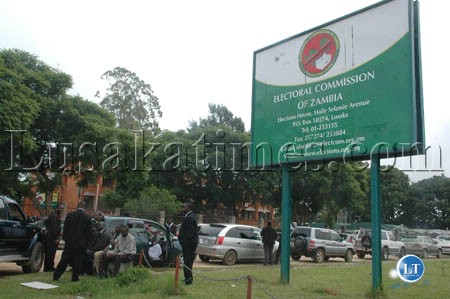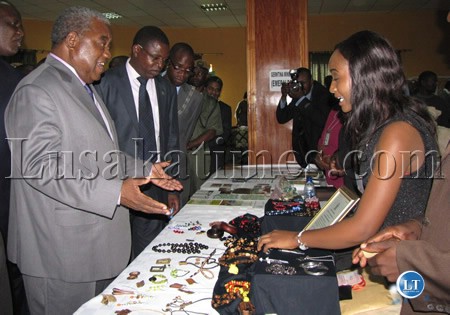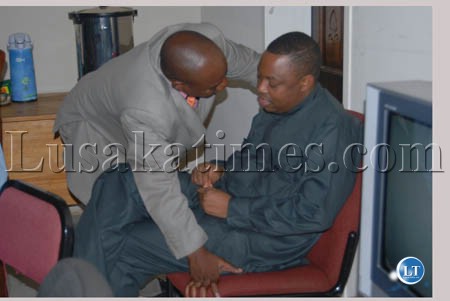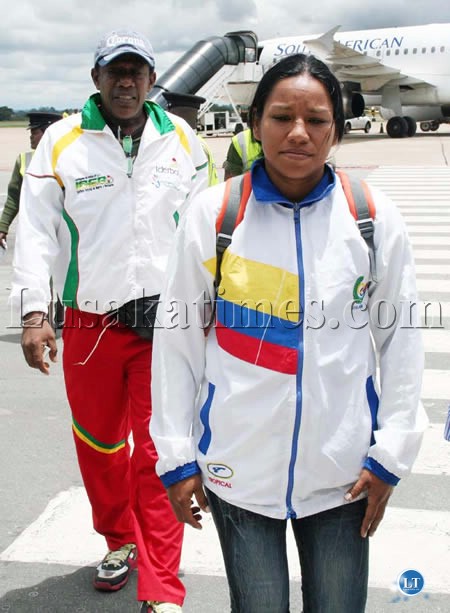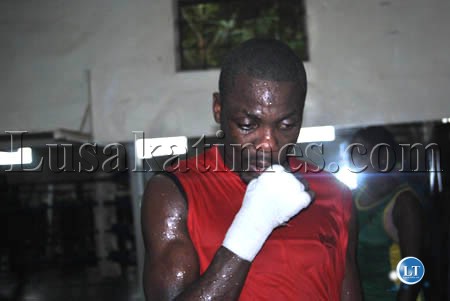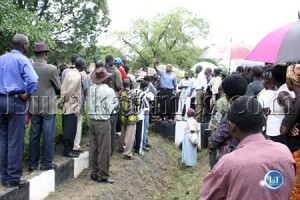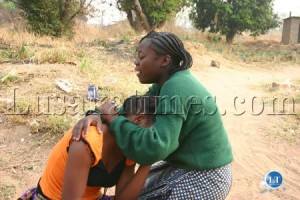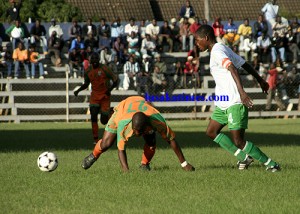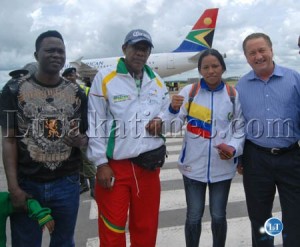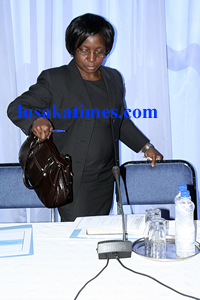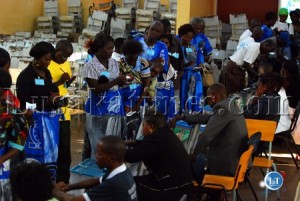 On Oct. 30, 1964, TIME magazine reported on the celebration of the independence of Zambia (formerly Northern Rhodesia), with its new president, Kenneth Kaunda.
On Oct. 30, 1964, TIME magazine reported on the celebration of the independence of Zambia (formerly Northern Rhodesia), with its new president, Kenneth Kaunda.
But as the jubilant crowds celebrated, one man complained that the festivities were interfering with his “space program.” Edward Makuka Nkoloso informed the TIME reporter that his Zambian “astronauts” would beat both the US and the Soviet Union in the space race — by going to the moon, and then to Mars.
This was an unusual boast, to say the least. At the time, Zambia’s population numbered 3.6 million, with barely 1500 African-born high school graduates and less than 100 college graduates. Nkoloso himself was a grade-school science teacher, and self-appointed director of the country’s (unofficial) National Academy of Science, Space Research and Philosophy.
But he had big dreams, namely, using a catapult-inspired “firing system” to send a 10×6 aluminum and copper rocket holding ten Zambians and a 17-year-old African girl (and her cat) to Mars. He figured he could get them to the moon by 1965. All he needed was $700 million from UNESCO to fund the project.
In a newspaper editorial, Nkoloso claimed to have studied Mars for some time from telescopes at his “secret headquarters” outside Lusaka, and announced that the planet was populated by primitive natives. (He graciously added that his missionaries would not force the native Martians to convert to Christianity.) In fact, he said, he could have achieved the conquest of Mars a mere few days after Zambia’s independence had UNESCO come through with the funding. Oh, he also called for the detention of Russian and American spies trying to steal his “space secrets” — and his cats.
It’s hard not to like Nkoloso, based on what little we know of him today. Here’s a grade school science teacher setting up his own national space program with a small group of trainees who had to roll downhill in a 44-gallon oil drum as part of Nkoloso’s plan to simulate the sensation of rushing through space. Zero gravity? He simulated that by having them swing from the end of a long rope, cutting the rope when they reached the highest point so they went into freefall. He also taught them how to walk on their hands, “the only way humans could walk on the moon.”
Naive? Ignorant? Sure. Especially in light of his less than dedicated volunteers: “They won’t concentrate on space flight; there’s too much love-making when they should be studying the moon,” he complained. Indeed, the much-touted girl astronaut, Matha, became pregnant and her parents brought her back to their village.
Nkoloso’s astronauts never got to Mars. Or the moon. Or even out of Lusaka. The Zambian government carefully distanced itself from his project. Even today, the US is the only country to have successfully landed a spacecraft on Mars, and has yet to spearhead a manned mission to the red planet. But while Nkoloso may have been a bit crazy, he had clearly zeroed in on the future: space travel was going to be a big deal. And he wanted Zambia to be a part of it.
We’re going to Mars!
WITH A SPACEGIRL, TWO CATS AND A MISSIONARY
by Edward Makuka Nkoloso
I see the Zambia of the future as a space age Zambia,more advanced than Russia or America.In fact in my academy of scientists our thinking is six or seven years ahead of both powers.
It is unlucky for Lusaka that I did not have a chance to run for mayor.If I had been elected the capital city of Zambia would have be4en another Paris if not New York.
If I had been mayor matero kamwala and chilenje suburbs would quicklyb have been filled with flats and skyscrapers.Old houses would have vanished.
But never mind we will have our Paris yet.If I had had my way Zambia would have been born with the blast of the academys rocket being launched into space.But the Independence celebrations committee said that would terrify the guests and possibly the whole population.I think they were worried about the dust and noise.
Crew ready
Its a great pity,all is ready at our secret headquaters in a valley about seven miles from Lusaka.The rocket could havev been launched from indepence stadium and Zambia would have conquered Mars only a few days after Independence.Yes thats where we plan to go – Mars.
We have been studying the planet through telescopes at our headquaters and are now certain Mars is populated by primitive natives.Our rocket crew is ready.
Specially trained space girl Matha Mwamba two cats(also specially trained) and a missionary will be launched in our first rocket.
But I have warned the missionary he must not force christianity on the people in Mars if they do not want it.
One other difficulty has been holding us up.UNESCO has not replied to our request for £7,000,000 and we need that money for our rocket programme.Then we can lead world science.
I feel the Zambian government should help now if we are to become controllers of the Seventh Heaven Interstellar space.The government must pass strong bills to deal with the satanic plots of our enemies.
I have known for a long time that Russian spies are operating in Zambia.Yes and American spies are all over town too.They are all trying to capture Matha and the cats.They want our space secrets.
These people must be dealt with immediately after independence if I am to keep my space lead.Dtention without trial for all spies is what we need.
Otherwise I am happy with the Government but it must encourage youngsters to join the academy.
At the moment they have knocked down my academy building in matero.That is not good.I hope they build modern flats in its place to provide more offices for us.
The capital of the new scientfic Zambia must look beautiful.People from afar must not see a slum as the capital of the worlds greatest scientific state.
Zambians are inferior to no men in science technology.My space plan will surely be carried out.
Weird as that might sound, the Zambian astronaut made international headlines with his ingenious invention, attracting interviews from Times magazine and Discovery Channel
But there was only one problem, Mr. Nkoloso needed US$700 million from UNESCO to fund the project and that was about 46 years ago.
His idea had to die a natural death, leaving Zambians and other followers of his invention with so many unanswered questions.
In fact one of the concerned citizens wrote the Ministry of Science and Technology.
He wanted to find out the outcome of the 1964 space flight program and if the project had received any funding from well wishers.
The Director
Ministry of Technology
Lusaka
Zambia
Dear Sir,
Could you inform me of the outcome of Zambia’s space flight program of the 1960s.
An official news report of November 3 1964 stated:
America and Russia may lose the race to the moon, according to Edward Mukaka Nkoloso, Director-General of the Zambia National Academy of Space Research.
His ten Zambian astronauts and a seventeen-year-old African girl are poised for the countdown. He said: “I’ll have my first Zambian astronaut on the moon by 1965. My spacemen are ready, but we’re having a few difficulties…we are using my own firing system, derived from the catapult.”
Mr. Nkoloso continued: “To really get going we need about seven hundred million pounds. It sounds a lot of money, but imagine the prestige value it would earn for Zambia. But I’ve had trouble with my space-men and space-women. They won’t concentrate on space-flight; there’s too much love-making when they should be studying the moon. Matha Mwamba, the seventeen-year-old girl who had been chosen to be the first coloured woman on Mars, has also to feed her ten cats, who will be her companions on the long space flight… I’m getting them acclimatised to space-travel by placing them in my space-capsule every day. It’s a 40-gallon oil drum in which they sit, and I then roll them down a hill. This gives them the feeling of rushing through space. I also make them swing from the end of a long rope. When they reach the highest point, I cut the rope – this produces a feeling of free fall.”
I assume that the request for seven hundred million pounds was made by Z.N.A.S.R. to the United Nations. Please inform me whether Zambia received the grant and whether significant progress in space flight resulted.
Yours sincerely,
Government’s response was precise:
REPUBLIC OF ZAMBIA
MINISTRY OF POWER, TRANSPORT AND COMMUNICATIONS
P.O. Box 50065
Lusaka
11th July, 1988
Mr B. Stett,
…………..
Dear Sir,
I refer to your letter dated 24th May, 1988 in connection with outcome of Zambia’s space programme.
I wish to inform you that the matter under discussion was never seriously taken up by the Zambian Government and as such no official backing was rendered to Mr. Mukaka Nkoloso’s efforts. The programme therefore died a natural death.
Yours faithfully,
E. N. Kamuyuw
Assistant Secretary
for/ Permanent Secretary
Ministry of Power, Transport And Communications
[Discovery News,TIME.com,Tripod]



